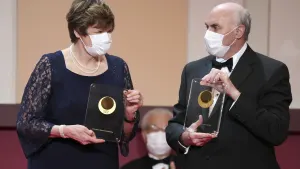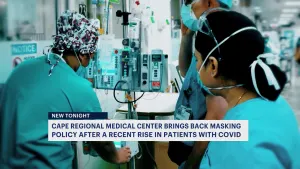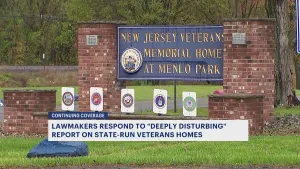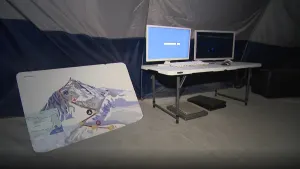‘There was no playbook.’ State police will use lessons learned from pandemic to protect New Jersey
The New Jersey state police are taking the lessons learned over the last two years of the COVID-19 pandemic and using them to prepare for the next disaster.
•
Mar 16, 2022, 12:35 AM
•
Updated 1,204 days ago
Share:
More Stories
0:33

US Supreme Court rejects appeal on Rutgers University COVID-19 vaccine mandate case
372ds ago
Nobel in medicine goes to 2 scientists whose work enabled creation of mRNA vaccines against COVID-19
638ds ago0:21

Biden administration announces $600M to produce COVID tests and will reopen website to order them
650ds ago
Murphy administration: No plans to implement any COVID-19 restrictions
656ds ago0:39

Cape May hospital asking patients to wear mask amid COVID surge
657ds ago2:57

Lawmakers call for investigation, overhaul following DOJ report about NJ’s COVID response in veterans homes
659ds ago0:33

US Supreme Court rejects appeal on Rutgers University COVID-19 vaccine mandate case
372ds ago
Nobel in medicine goes to 2 scientists whose work enabled creation of mRNA vaccines against COVID-19
638ds ago0:21

Biden administration announces $600M to produce COVID tests and will reopen website to order them
650ds ago
Murphy administration: No plans to implement any COVID-19 restrictions
656ds ago0:39

Cape May hospital asking patients to wear mask amid COVID surge
657ds ago2:57

Lawmakers call for investigation, overhaul following DOJ report about NJ’s COVID response in veterans homes
659ds agoThe New Jersey state police are taking the lessons learned over the last two years of the COVID-19 pandemic and using them to prepare for the next disaster.
News 12 New Jersey was given an exclusive look inside the Regional Operations and Intelligence Center in Ewing where those lessons are being put to use.
“There was no playbook to go to, here. State Police was started in 1921. That Spanish Flu was in 1918,” says State Police Superintendent Col. Patrick Callahan.
There is now an updated playbook for the pandemic in the state’s Emergency Operations Plan signed off on by Callahan on Jan. 31. Callahan also serves as the head of the state’s Office of Emergency Management. That secret document is not shared with the public and is regularly altered and updated with lessons learned from real-world events.
“It’s not like we just stick it on the shelf and say, ‘We’re good.’ There’s always edits and tweaks that we’re always looking to be better,” Callahan says.
The first of Gov. Phil Murphy’s 257 coronavirus briefings were held at the Regional Operations and Intelligence Center. Just down the hall from the media room is the state’s nerve center for emergency management. It is where officials manage crises from hurricanes, to riots, to terrorist attacks.
Callahan says that the goal is for the staff to gather information and then get it to him.
“Basically, if you can picture this as the worker bees from departments across the state, gathering information, getting it to here, deciphering it,” he says. “That information gets pushed up to there – that’s the executive conference room for the governor and the cabinet.”
Callahan says that this is the room where the governor would have teleconference meetings with the president and vice president every Monday.
Callahan was appointed to the position by former Gov. Chris Christie, but has spent the majority of his time as colonel at Gov. Murphy’s side, especially during the COVID-19 briefings.
“It’s very collaborative. A lot of communication. Sometimes constant communication, that’s what makes him so effective,” Callahan says.
The superintendent says that he does not recall any time when Murphy gave him an order that he did not agree with.
“I think it was a collaborative effort, as you can imagine, during an unprecedented time,” he says.
Leading more than 2,500 state troopers and being one of the state's top law enforcement officials aren't the only responsibilities for Callahan. He only missed two of the 257 coronavirus briefings - one because his wife had surgery and the other was to be at his daughter's wedding.
More from News 12
1:31

What's Cooking: Uncle Giuseppe's Marketplace's prime rib roast
1:30

Looking for a road trip? Check out Big Snow at American Dream in East Rutherford
1:27

What's Cooking: Uncle Giuseppe's quiche lorraine
2:34

Guide: Safety tips to help prevent home burglaries
2:19

Guide: Safety measures to help prevent fires and how to escape one
2:36
